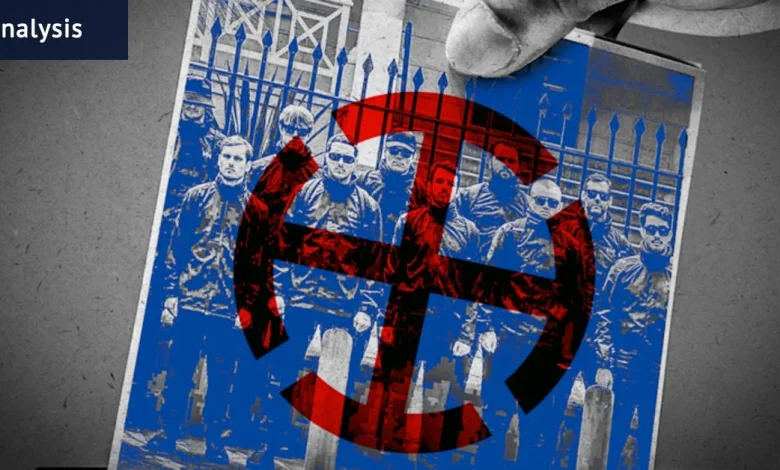‘Not post-war Nazi Germany’: Is banning political parties the answer?

The objections are relevant to whether registration should be refused. The commission says there is “no limit” on the matters it may consider in making its decision.
NSW Premier Chris Minns has said the state electoral commission has the “highest barriers to entry to new political parties of any jurisdiction in the country”.
At the federal level, a non-parliamentary party – a party without a sitting MP or senator – needs at least 1500 members. There’s also a ban on obscene names and logos. But it is a relatively permissive regime.
Registration not required
Orr said it was important to remember that “you don’t have to register a political party to run in elections” in Australia.
“You can be avowed Nazis … and you can hand out pamphlets. All that registration does is get your name and logo on the ballot paper,” he said.
The National Socialist Network protesters outside NSW Parliament House.Credit: Flavio Brancaleone
“That is valuable to small parties; they don’t have the same money to advertise and staff polling booths. You can understand why they would want to get that kind of prominence at the actual voting stations.”
On the other hand, Orr said appearing as an independent on the ballot had “a certain cachet” and might appeal to voters who were unsupportive of political parties generally.
He said candidates who ran as independents but were linked to a broader group could use social media and other networks “to get out the word that … I’m a member of this organisation”.
But University of NSW Professor Rosalind Dixon, a constitutional law expert, said that “we still live in a world in which political parties are the major players in our democracy”, notwithstanding the success of some independents.
Loading
Unlike Orr, Dixon has called for an urgent revisiting of existing laws to give electoral commissions explicit power to ban parties espousing racial hate and vilification as founding policies and values.
“What one sees if you study this issue in the broad sweep of global history is you only get a narrow window to prevent [this],” Dixon said.
“Let’s hope this goes away, and this is moot … but faced with a credible Nazi-style party, or anything that resembles it … you’ve got to set up systems in advance that allow for it before it becomes a big threat. [If] we wait, it could be too late.”
‘Can of worms’
Orr said the question of banning political parties, as is possible in Germany under changes to the constitution post-World War II, opens “a can of worms”. The German system involves a court process.
“We are not post-war Nazi Germany; we’re not Turkey [with] serious Islamist forces; we’re not Singapore,” Orr said. “We are a society where we have compulsory voting and a relatively stable political system.
“Once you start banning groups, you’ve got to say: well, how do we define who gets banned? You either have ‘whack-a-mole’ … or you try to craft a general definition. I don’t think we want to be just changing electoral laws to get at the one group.”
The Australian equivalent involved the Menzies government, whose attempt to ban the Communist Party in 1950 was ultimately deemed unconstitutional by the High Court. A referendum to change the constitution also failed.
Dixon said it would not be “principled for legislation to target a particular entity”. The criteria for prohibiting registration of a political party would need to be defined “very tightly” to avoid the law being excessively broad and restricting political contest, she said.
Dixon envisaged a system where the decision was made initially by the electoral commission, applying legislative criteria, “with very broad provision for review by a court”.
In her view, parties should be banned “if, and only if, their formal policy platform or demonstrated pattern of activity threatens to undermine the minimum core of democracy”.
What is a member?
Orr said one area of the law that might be tightened was the definition of a “member” of a political party for the purposes of the state and federal thresholds on membership numbers required for registration.
Loading
He doubted the neo-Nazi group “would have anywhere near” the 1500 members required federally for registration, but he noted the definition of member was quite loose.
“You don’t have to pay a membership fee, for instance. Basically, the [Clive] Palmer party has something more like a big email list,” Orr said.
But even if they did register, Orr did not believe they would garner “anywhere near” 4 per cent of first preference votes, meaning “they’re never going to get any public funding”.
The time required for registration is also an issue. The next NSW election is in March 2027, and the next federal poll is in 2028.
Registering a political party does not happen quickly, Orr said. “The electoral commission takes many, many months,” he said.
Start the day with a summary of the day’s most important and interesting stories, analysis and insights. Sign up for our Morning Edition newsletter.





